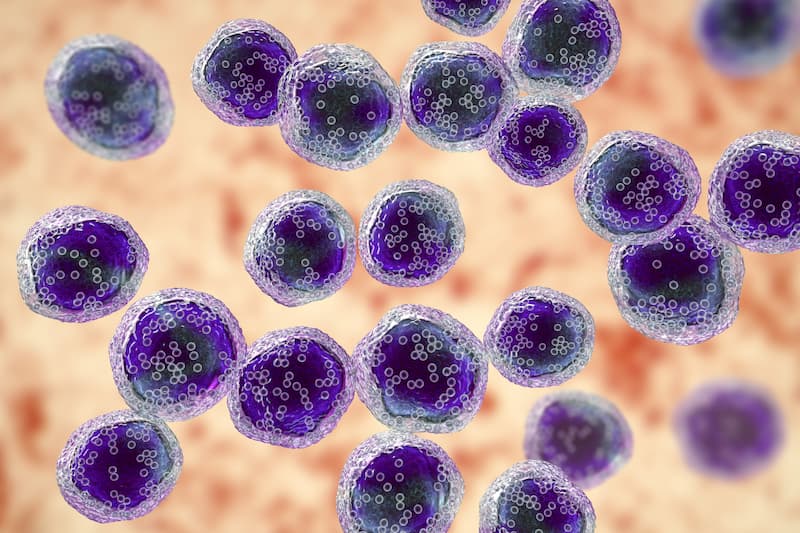Epcoritamab Earns EU Approval in Relapsed/Refractory Follicular Lymphoma
Conditional marketing authorization for epcoritamab in the European Union is based on findings from the phase 1/2 EPCORE NHL-1 trial.
The conditional marketing authorization follows a positive opinion from the Committee for Medicinal Products for Human Use of the European Medicines Agency recommending approval of epcoritamab in this patient population.

The European Commission has granted conditional marketing authorization to epcoritamab-bysp (Epkinly) as a treatment for patients with relapsed/refractory follicular lymphoma following at least 2 prior lines of therapy, according to news releases from developers AbbVie and Genmab.1,2
The conditional marketing authorization follows a positive opinion from the Committee for Medicinal Products for Human Use of the European Medicines Agency recommending approval of epcoritamab in this patient population.3
Supporting data for the conditional marketing authorization came from the phase 1/2 EPCORE NHL-1 trial (NCT03625037) assessing subcutaneous epcoritamab in those with relapsed, progressive, or refractory CD20-positive mature B-cell non-Hodgkin lymphoma, including patients with follicular lymphoma. Updated findings from the EPCORE NHL-1 trial were published in Lancet Hematology.4
Among patients with follicular lymphoma, epcoritamab elicited an overall response rate (ORR) of 82.0% (n = 105/128; 95% CI, 74.3%-88.3%). Additionally, complete responses (CRs) occurred in 62.5% (n = 80/128; 95% CI, 53.5%-70.9%) of patients. Investigators observed responses across all prespecified patient subgroups, which included those with high-risk disease features.
Data showed a median time to response of 1.4 months (IQR, 1.3-1.5) and a median time to CR of 1.5 months (IQR, 1.4-2.8). Among patients with a response in cycle 10 of treatment and beyond, 92% (n = 45/49) had sustained responses when epcoritamab was given every 4 weeks.
The safety profile of epcoritamab in EPCORE NHL-1 was comparable with prior reports of the agent. Common treatment-emergent adverse effects (TEAEs) reported in the pooled safety population (n = 382) included cytokine release syndrome (66%), injection site reactions (57%), and COVID-19 symptoms (21%). Fatal TEAEs occurred in 13 patients, which included those who had COVID-19 (5%), pneumonia sepsis myelodysplastic syndrome, interstitial lung disease, organizing pneumonia, and cardiopulmonary failure all of which occurred in 1 patient each.
“The European approval of [epcoritamab] for the treatment of follicular lymphoma after 2 or more prior treatments is yet another step forward in our aspiration to develop TEPKINLY as a potential core therapy across multiple B-cell malignancies,” Mariana Cota Stirner, MD, PhD, vice president and therapeutic area head for hematology at AbbVie, said in a press release on the approval.1 “Together with our partner, Genmab, we are thrilled with today's approval which advances our commitment to elevating care for people living with cancer.”
A step-up dosing regimen occurred in the EPCORE NHL-1 trial. During cycle 1, patients were given 0.16 mg on day 1, 0.80 mg on day 8, and subsequent 48 mg doses to lower AE risk. During cycle 1 of the dose optimization cohort, a second intermediate dose of 3 mg on day 15 was given.
The primary end point of the trial’s expansion portion was ORR per independent review committee assessment. Secondary end points included duration of response, CR rate, duration of CR, progression-free survival, and time to response.
Patients 18 years and older with histologically confirmed grade 1 to 3A CD20-positive follicular lymphoma and 2 or more prior lines of therapy were eligible for enrollment on the trial. Other eligibility criteria included having an ECOG performance status of 0 to 2.
In June 2024, the FDA granted accelerated approval to epcoritamab in relapsed/refractory follicular lymphoma after a minimum of 2 prior lines of treatment. Supporting data for the approval came from the EPCORE NHL-1 trial.5
“The approval of epcoritamab by the European Commission is a promising update for the lymphoma community. Given that relapsed or refractory follicular lymphoma can be a very challenging form of cancer to treat, especially in later lines of therapy, it is critical that patients and physicians have additional options when it comes to treating this type of cancer,” Kate Rogers, chief executive officer of the Follicular Lymphoma Foundation, concluded.2
References
- European Commission grants second indication approval for TEPKINLY® (epcoritamab) for the treatment of adults with relapsed/refractory follicular lymphoma. News release. AbbVie. August 19, 2024. Accessed August 20, 2024. https://tinyurl.com/2s36c27n
- TEPKINLY® (epcoritamab) receives second European Commission approval for the treatment of adults with relapsed/refractory follicular lymphoma. News release. Genmab A/S. August 19, 2024. Accessed August 20, 2024. https://tinyurl.com/3cbp9rc4
- AbbVie receives positive CHMP opinion for epcoritamab (TEPKINLY®) for the treatment of adults with relapsed/refractory follicular lymphoma. News release. AbbVie. June 28, 2024. Accessed August 20, 2024. https://prn.to/45MTiUM
- Linton KM, Vitolo U, Jurczak W, et al. Epcoritamab monotherapy in patients with relapsed or refractory follicular lymphoma (EPCORE NHL-1): a phase 2 cohort of a single-arm, multicentre study. Lancet Haematol. Published online June 15, 2024. doi:10.1016/ S2352-3026(24)00166-2
- FDA grants accelerated approval to epcoritamab-bysp for relapsed or refractory follicular lymphoma. News release. FDA. June 26, 2024. Accessed August 20, 2024. https://tinyurl.com/26s9myey
Highlighting Insights From the Marginal Zone Lymphoma Workshop
Clinicians outline the significance of the MZL Workshop, where a gathering of international experts in the field discussed updates in the disease state.